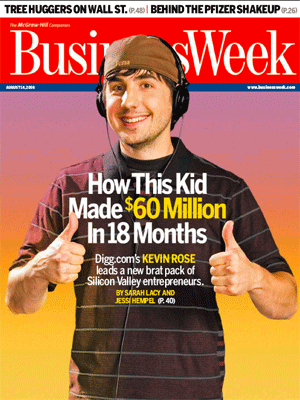I don’t think the Google acquisition of YouTube is in itself an indication of dotcom-bubble-style thinking, as much of the mainstream coverage must inevitably suggest. YouTube is unprofitable — it hasn’t had much revenue to speak of at all till recently, from what I can tell. But it’s a great site and service and has a vast audience. It is, in short, much like Google was for the several years before Google stumbled on the brilliant revenue model that has propelled it to giddy peaks of valuation. Google wants to lead the Net video field; YouTube needs deep pockets to fund its bandwidth bills and build out the infrastructure to support its growth, and corporate help steering through the intellectual-property maze its business represents. It also needs a brain trust that has experience figuring out how to make money from a service with millions of users but no business model. That’s a good match.
$1.65 billion is a lot of money, but the tut-tutting chatterboxes are forgetting that, er, this isn’t cash changing hands, it’s stock. At Google’s current valuation this amount represents very roughly one percent of the company. One of the chief reasons companies like Google go public in the first place — aside from rewarding early investors and management — is so it can leverage market enthusiasm for these sorts of acquisitions. Google’s leaders know — or they ought to know — that its stock won’t stay over $400 forever. They’re doing the smart thing, playing their cards while their deck’s value is high.
No, neither Google nor YouTube is engaging in bubble-think — but watch for the onset of that condition in coming days and weeks, as the GoogTube deal gets turned into a valuation yardstick by hungry also-rans and competitors. “Let’s see, YouTube had X users and sold for $1.6 billion — therefore my company with 1/20th X users is worth at least $80 million!” That sort of talk is cheap. It was already beginning to turn up on the cover of Business Week, even before this deal. If and when people start investing on the basis of such logic, we’ll know that the awful era of TheGlobe.com has truly been reborn.
[tags]google, youtube, deals, bubble[/tags]

